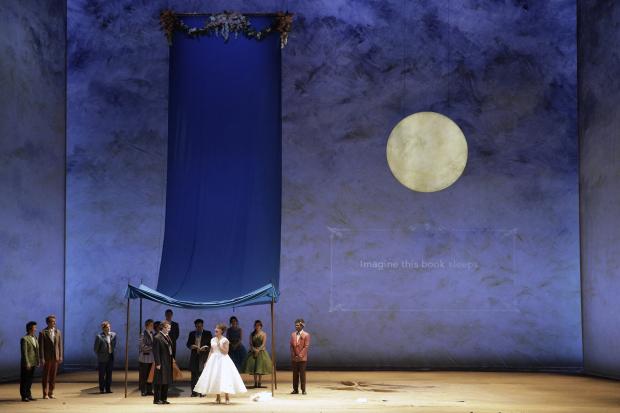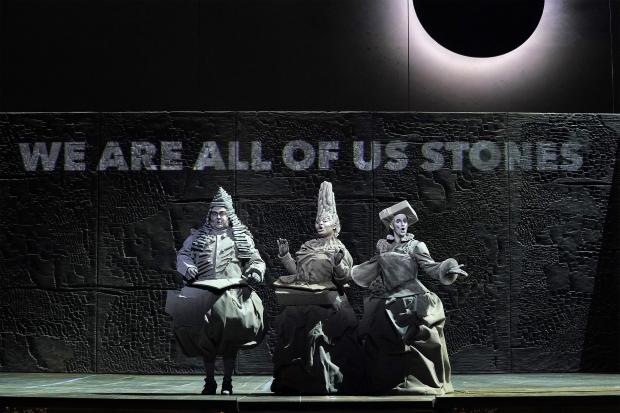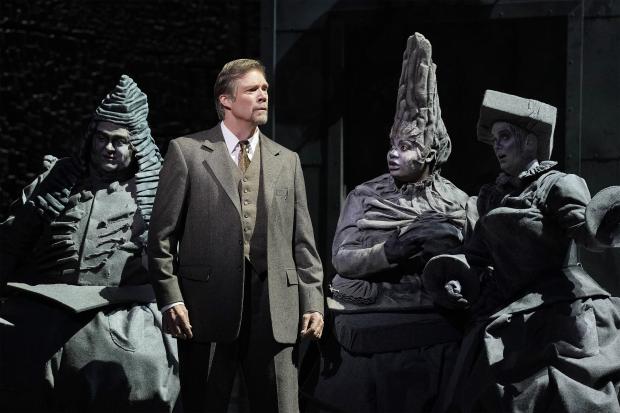[NOTE: This review may contain plot spoilers for those unfamiliar with this 2,600 myth.]
LA Opera’s world premiere of composer Matthew Aucoin and librettist Sarah Ruhl’s sublime Eurydice is an optically and aurally stunning reinterpretation of the ancient Greek myth about Orpheus (Canadian baritone Joshua Hopkins) and the title character (depicted by Angeleno soprano Danielle de Niese and at the performance I experienced, by Rhode Island soprano Erica Petrocelli). Like Romeo and Juliet - consider that Shakespeare’s tragedy inspired the beloved stage and screen adaptations of West Side Story in 1957 and 1961, with a new iteration opening on Broadway this week, with a Steven Spielberg movie remake waiting in the wings - there have been many versions of this immortal romance derived from Grecian mythology.
Composer Christoph Willibald von Gluck and librettist Pierre-Louis Moline’s 1774 opera Orpheus and Eurydice graced the Dorothy Chandler Pavilion in 2018. 1959’s Black Orpheus is a Brazilian-set film. Ruhl’s 2003 play based on the legend has been performed at regional U.S. theaters and in the UK, while L.A.’s Boston Court did a different drama in 2011. Other renditions include Jean Cocteau’s screen trilogy, which Philip Glass adapted part of into a 1991 chamber opera.
There’s a reason why this myth continues to haunt us, just as Shakespeare’s “star-crossed lovers” have, from the Elizabethan theater to Franco Zeffirelli’s 1968 classic movie and beyond: Along with Romeo and Juliet, the saga of Orpheus and Eurydice is simply one of the greatest love stories of all time. And the great news for opera lovers is that Aucoin and Ruhl’s operatic iteration is a stellar retelling of the epic story of the musician who, literally, dares to go to hell to rescue his beloved.
I’ve often groused about contemporary revivals of ancient Greek works that don’t include togas and how remakes often miss their mark. But this modern dress edition is right on target as - while it succeeds in retaining the theme and flavor of the myth that can be traced all the way back to sixth century B.C. Greece - Aucoin and Ruhl’s work manages to re-imagine the age-old tale for 21st century audiences through the conventions of the operatic medium.
Eurydice also borrows heavily from conventions of the horror movie genre, with Taiwan scenery designer Daniel Ostling’s sensational sets expressing the Underworld, complemented by Croatian Ana Kuzmanic’s costuming of Hades’ inhabitants, both in their LA Opera debuts. But when the curtain lifts for Eurydice we find the ill-fated lovers not in hell but sunning themselves in bathing suits at a beach resort (perhaps they’re holidaying at the Greek Islands?), where the poet pops the question.
This sets the stage for what’s to come. To make a long myth short, at the lovers’ wedding Hades, lord of the Underworld (played with Josh Gad-Jack Black-ish panache by U.K. tenor Barry Banks), lures Eurydice to hell. And in what may be the greatest errand in mythological history, our man Orpheus rather courageously embarks on the River Styx to fetch his betrothed way down yonder in Hades’ dim domain.
Ruhl’s storyline departs sharply from the original telling by emphasizing the titular female lead, whereas previously Orpheus had been the protagonist. Ruhl adds a complex subtext revolving around Eurydice’s Father (Rancho Cucamonga baritone and LA Op veteran Rod Gilfry). Indeed, one might think at times he/she is watching a retelling of the Electra myth, rather than Orpheus’. The opera also introduces a character called “Orpheus’s Double” (Texan countertenor John Holiday), who appears, according to Aucoin’s note in Performances Magazine, “when [Orpheus] goes into his musical trance, or shows flashes of his superhuman ability…” (Interestingly, Hopkins is white while his character’s benevolent doppelganger Holiday is Black.)
During their sojourn in the Underworld our underdog Earthlings encounter bizarre otherworldly denizens of hell, including three wonderfully costumed rocky characters - Little Stone (Pasadena soprano Stacey Tappan), Big Stone (Texas mezzo-soprano Raehann Bryce-Davis) and Loud Stone (New Yorker tenor Kevin Ray), who render some charming songs and stage special FX.
The music, conducted with verve by composer Aucoin, ranges from the lush to chilling, with LA Op stalwart Grant Gershon directing the chorus. Mary Zimmerman does yeoman’s (yeowoman’s?) work directing the oversized cast in her superb LA Opera debut. The choreo is by Denis Jones, with mood-setting lighting designed by T. J. Gerckens, both in their LA Opera debuts. Although there are supertitles, Eurydice is sung entirely in English (not Greek!).
Eurydice has some interesting lines about what it’s like to be in love with an artistic genius. But although Ruhl’s libretto is written by a woman and focuses on the female character, feminists’ antennas may rise at this archetypal depiction, thousands of years old, of male-female relationships. Orpheus is not only endowed with musical and poetic brilliance, but is admirably, staggeringly heroic in his death-defying derring-do, seeking to retrieve his beloved from the realm of the dead. On the other hand, is Eurydice worth his sacrifice? She can be seen as capricious and inconstant, and in Ruhl’s retelling, suffering under an extreme father complex. (Paging Dr. Freud!)
Nevertheless, this jaw dropping modern update of a myth dating back to antiquity is an eye- - and ear! - popping operatic extravaganza that’s not to be missed by operalovers.
Eurydice is being performed Thursday Feb. 20 at 7:30 p.m. and Sunday Feb. 23 at 2:00 p.m. by LA Opera at the Dorothy Chandler Pavilion, 135 N. Grand Ave. For more info: (213)972-8001; https://www.laopera.org/performances/201920-season/eurydice/.
“The Hawaii Movie and Television Book” co-authored by L.A.-based reviewer Ed Rampell is available at: https://mutualpublishing.com/product/the-hawaii-movie-and-television-book/ .



